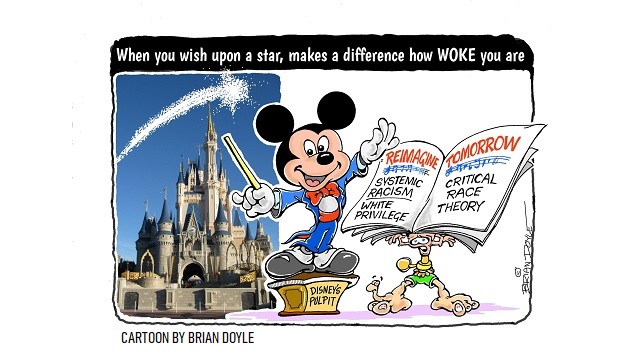Disney’s Embrace of Wokeness is a Mickey Mouse Move

Wokeness is a bottomless pit of virtue signaling.
If there’s a lesson we can learn from Disney of late, it’s this: wokeness is a bottomless pit — its appetite can never be satisfied.
I’ve previously written about Disney’s attempt to purify its film canon by slapping “offensive content” labels on classics like The Muppet Show, The Aristocats, Dumbo, and Peter Pan.
I’ve also critiqued their empty attempts at virtue signalling — threatening to boycott Georgia if the state passed pro-life legislation, all the while filming Mulan in Communist China, in the same province as the CCP’s notorious Uighur concentration camps.
Since the weekend, the fearless Christopher Rufo released a bombshell story exposing just how deep the woke rot has spread at Disney. Publishing a trove of whistleblower documents, he wrote:
In the past year, Disney executives have elevated the ideology of critical race theory into a new corporate dogma, bombarded employees with trainings on “systemic racism,” “white privilege,” “white fragility,” and “white saviors,” and launched racially segregated “affinity groups” at the company’s headquarters.
Rufo explained that “multiple Disney employees, who requested anonymity out of fear of reprisals” spoke of a training program called Reimagine Tomorrow that has become “deeply politicized and engulfed parts of the company in racial conflict”.
If you’re familiar with critical race theory dogma, nothing in these documents will surprise you. They are full of the usual tropes about the United States having a “long history of systemic racism and transphobia” — along with the need for white employees to “take ownership of educating [themselves] about structural anti-Black racism”.
Even more troubling — but no less surprising — the documents claim that competition, individualism, and timeliness, are “white dominant” values that “perpetuate white supremacy culture”.
Realising that everyday Americans rightly find these ideas toxic, divisive and absurd, Christopher Rufo has been on a mission this year to turn the heat up on schools, corporations and states that indulge them. His exposé on Disney was part of this effort.
The Walt Disney Company obviously realised it was now on the back foot. So several days later, the company released a statement, claiming that, due to Rufo’s reporting:
These internal documents are being deliberately distorted as reflective of company policy, when in fact their purpose was to allow diversity of thought and discussion on the incredibly complex and challenging issues of race and discrimination that we as a society and companies nationwide are facing.
But as Rufo subsequently pointed out, he had merely “published direct quotations, contextual screenshots, and the original source documents in their entirety”. As for the claim that this somehow didn’t reflect company policy, Rufo countered that “the antiracism program was branded with Disney’s logo, endorsed by executives, and disseminated through the company’s internal portal.”
Perhaps Disney’s most Mickey Mouse move was claiming that the purpose of its antiracism program was to “allow diversity of thought” on the topic of race. On the contrary, a fixed feature of critical race theory is its intolerance for any viewpoint that rejects the framework of “white supremacy” and “systemic racism”. Indeed, as part of his original report, Rufo explained that “conservative and Christian employees are actively discouraged from voicing their opinions” at Disney.
Not content with these victories, Rufo held Disney’s feet to the fire even further, launching a series of tweets aimed squarely at the company’s executive team. “Disney’s top executives are four white males with a net worth of $1+ billion,” he announced, “And yet, they encourage their hourly-wage employees to complete ‘white privilege’ checklists and ‘work through feelings of guilt, shame, and defensiveness’ about their whiteness.” He went on:
Disney tells American employees to reject “equal opportunity” and embrace “equality of outcome.” Disney Chairman @RobertIger built a fortune of $690 million, while Bangladeshi workers making Disney t-shirts were paid as little as $0.08 an hour. Woke capitalism is built on lies.
Adding some final nails to the coffin, Rufo tweeted, “Disney’s executive team… [are] fake anti-racists, using buzzwords to deflect attention from their moral transgressions”.
By midway through the week, Disney had removed its entire antiracism program from the company’s internal portal. It turns out that promoting race essentialism and collective guilt — and dividing people by their innate characteristics — is bad for public relations.
The challenge with critical race theory is that it does this with a seductive veneer — buzzwords like “diversity”, “equity” and “antiracism”. But when you peel back the layers, the truth is exposed: wokeness is a fraud.
Disney best stick to making movies.
COLUMN BY
Kurt Mahlburg
Kurt Mahlburg is a writer and author, and an emerging Australian voice on culture and the Christian faith. He has a passion for both the philosophical and the personal, drawing on his background as a graduate… More by Kurt Mahlburg
RELATED ARTICLE: Families are the collateral damage of transgender transitions
EDITORS NOTE: This MercatorNet column is republished with permission. ©All rights reserved.

